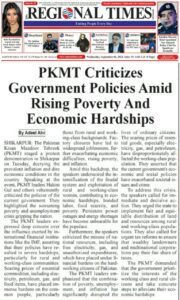Staff Reporter | March 30, 2025
Peshawar – For the past several years, the Pakistan Kissan Mazdoor Tehreek (PKMT), in collaboration with other peasant and anti-imperialist movements such as Roots for Equity, the Asian Peasant Coalition (APC), the People’s Coalition on Food Sovereignty (PCFS), the Pesticide Action Network Asia Pacific (PANAP), and the International League of Peoples’ Struggle (ILPS), has been celebrating March 29th as the International Day of Landless People.
The aim of commemorating this day is to highlight the struggles of small and landless peasants for food sovereignty and genuine agrarian reforms worldwide, according to a press release issued here on Saturday. The day also serves to expose the oppression, coercion, and exploitation by multinational corporations and the imperialist countries that represent them, as well as the governments of Third World countries.
“Currently, the world, especially Pakistan, is gripped by a severe economic and environmental crisis. Millions of people, particularly the working class, are suffering from extreme poverty, unemployment, and hunger. Even in these dire conditions, imperialist countries, especially the United States, continue to worsen the situation through institutions such as the IMF, World Bank, and WTO. At the same time, they are pushing the situation further downward. Simultaneously, they are engaged in environmental destruction, looting, and occupying land, water, oceans, forests, minerals, and other natural resources through war and militarization. The Zionist genocide of the Palestinian people and the occupation of Palestinian land at the behest of the U.S. is one such example.”
The people of Pakistan, particularly rural communities, are victims of these conditions. In Mansehra and other districts, local populations are being denied access to forests. In Peshawar, land is being taken from local communities under the guise of development projects. In the name of “Green Initiatives,” thousands of acres of land in Punjab and Sindh have been allocated for corporate agriculture.
The path has already been paved for multinational corporations to take over the dairy and livestock sector, which includes banning open and fresh milk and promoting packaged milk from corporate companies. Additionally, genetically modified seeds are being promoted, guaranteeing huge profits for seed giant companies.
Similarly, huge corporations like PepsiCo have been given thousands of acres of land to produce potatoes, displacing small and landless farmers, who are now forced to work as low-wage labourers. The potato seed on this land is owned by the corporation itself.
The digitalization of the food system, exemplified by the “Kissan Card,” represents a dangerous shift toward free-market policies, allowing not only agrochemical corporations but also financial and IT corporations to take over agricultural production.
The increase in sugarcane production is a serious concern, as it has pushed landless peasants into the throes of severe hunger and poverty. It has also been used for agro-fuel production as a false solution to climate change. Due to the cultivation of sugarcane, important food crops like wheat are being greatly affected. The profit-driven motives of corporations and imperialist agents are fully supported by the feudal class of the country.
The people, already struggling for survival, now face the ruling elite’s announcement of the construction of six new canals from the Indus River. The province of Sindh, especially Lower Sindh, is already a victim of unjust water distribution; the construction of these newly announced canals will further aggravate the situation, leading to large-scale protests against them.
Another grim development for the people suffering from hunger and landlessness is the federal government’s decision to abolish the minimum support price for wheat in 2024-2025 under IMF conditionalities. This policy will be devastating for small and landless farmers. Many farmers argue that even the previous year’s support prices set by the government were insufficient to cover their cost of production, but now handing over price determination to the free market will break their backs. Turning a blind eye to these extremely negative impacts on millions of farmers is yet another ruthless policy.
It is evident that the government is implementing neoliberal policies instead of protecting the interests of farmers, especially small and landless farmers, agricultural workers, fisherfolk, rural women, youth, and children. This has resulted in mass destruction of the working class.
PKMT remains firmly committed to fighting for the rights of small and landless peasants and the working class. We will continue the struggle for food sovereignty, advocating for a just and equitable distribution of land while ensuring the right to save and plant local and indigenous seeds, rejecting corporate control in food and agriculture. We stand in solidarity with the working class and will expose feudal, capitalist, and corporate land grabs while promoting systems that empower local communities to control and manage land, forests, mountains, seas, and other natural resources.
https://www.nation.com.pk/30-Mar-2025/pkmt-holds-event-to-mark-int-l-day-of-landless-people

